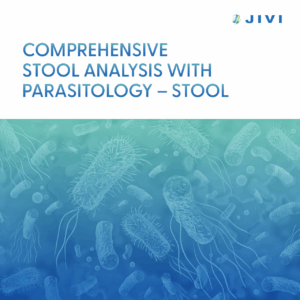Description
Zonulin Family Protein Test
What does this test measure?
This stool test measures the level of Zonulin, a protein that helps regulate the tight junctions between intestinal cells. Elevated Zonulin levels in stool (or serum) are believed to indicate increased intestinal permeability, commonly referred to as “leaky gut.” The release of Zonulin can cause these tight junctions to open.
Higher Zonulin levels have been associated with conditions such as celiac disease, type 1 diabetes, and irritable bowel syndrome (IBS). In practice, measuring Zonulin in stool can help determine if a patient’s gut barrier may be compromised. Some theories suggest that a compromised gut barrier could allow larger molecules or toxins to enter the bloodstream, potentially triggering inflammation or autoimmunity.
Who is this test most suitable for?
- High-stress lifestyle (stress can affect gut lining)
- Poor diet (high fat/sugar might alter permeability)
- Chronic NSAID use (NSAIDs can increase gut permeability)
- Individuals on a gluten-containing diet who suspect sensitivity
Clinical Use
Clinically, a functional medicine provider might use this test for a patient with multiple food sensitivities, autoimmune issues, or chronic GI inflammation to see if leaky gut is part of the picture.
If zonulin is high, interventions would include diet changes (like gluten-free if celiac or sensitive, since gluten can trigger zonulin release in celiac individuals), probiotics, and nutrients like L-glutamine to support the gut lining. It’s one piece of the puzzle in gut health assessment. It’s important to note that while popular in integrative medicine, “leaky gut” testing and zonulin are still being researched.








